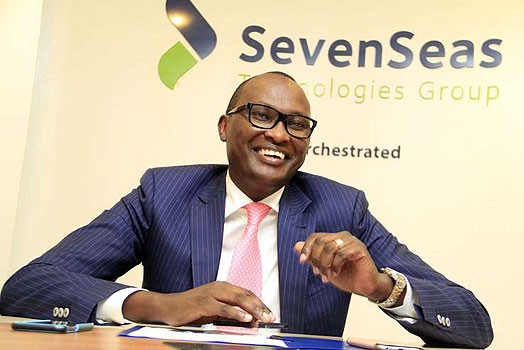Toyota deal adds city tech executive to billionaires list
Seven Seas Technologies co-founder and group chief executive Mike Macharia is the newest billionaire in town.
A recent sale of stake to the Africa development fund of Japanese multinational Toyota valued Seven Seas Technologies (SST) at an estimated Sh3.2 billion.
The transaction put the value of Mr Macharia’s 35 per cent shareholding in the company at Sh1.12 billion, just about 15 years since the company was started.
The tech firm is the poster child of his entrepreneurship journey.
At his swanky boardroom on Riverside Drive, it is hard to imagine Mr Macharia as the 25-year-old who “accidentally” started a tech company at a time when owning a mobile phone was a big status statement and the IT sector in Kenya was virtually non-existent.
“I don’t think the word billionaire fits. Maybe I am a billionaire at heart,” he protests matter-of-factly.
The venture capital arm of Toyota Tsusho’s injection of Sh300 million ($3 million) into Seven Seas in return for a 9.5 per cent stake, however, confirms that Mr Macharia, 41, is indeed a billionaire.
DROPPED OUT
A born Nairobian who grew up in the neighborhood that would later become Thika Road’s Garden Estate, Mr Macharia dropped out of a mathematics and physics course to become an accountant.
At the inception of Seven Seas, he had been working for a local IT company while exploring opportunities to study in the United States.
His journey would be diverted to Rwanda. His first contract involved helping the country’s national carrier set up its IT systems.
It was this contract that necessitated the setting up of the company, an initial partnership with Dutchman Rob Van Hoek — who left the company recently but retains a minority stake.
The ambition was burning. The name Seven Seas was meant to evoke the spirit of a company unlimited by geography or sector.
“Seven Seas aviation. Seven Seas hospitals,” Mr Macharia quips.
Rwanda proved a fertile ground for Seven Seas. Just as he was finishing the Rwanda Airlines job, the country’s military approached him with their own contract.
He soon found himself making a presentation to uniformed officers in a derelict building where the signs of Rwanda’s history of conflict were yet to be erased.
He clinched that deal too. Mr Van Hoek attributes this initial success of Seven Seas partly to Mr Macharia’s abilities as a salesperson.
CONVINCING APPROACH
“He was convincing in his approach. He was good at getting the customers and the deals. I was good at operations and executions,” he told the Business Daily in a phone interview.
The company grew, attracting the attention of James Gachui, a tycoon with a dominant presence in Kenya’s business circles with interests that ranged from manufacturing to retail trade.
The late Gachui was among the original 29 investors that founded TransCentury, then quaintly termed as an investment club.
Mr Gachui bought into the company, served as its board chairman for years, injecting into it “maturity”.
“He played a key role in guiding a young team toward institutionalisation of the business,” says Mr Macharia.
Today, a portrait of Mr Gachui greets all visitors walking into the third-floor boardroom at Seven Seas.
Another major investor in Seven Seas is the Abraaj Group, with 21 per cent stake. Mr Gachui’s estate still holds a stake in the company.
Seven Seas ventured where many others dared not. It spread to Nigeria, a market that was and remains daunting for many East African firms. It even has a foothold in Europe through a Portuguese subsidiary.




